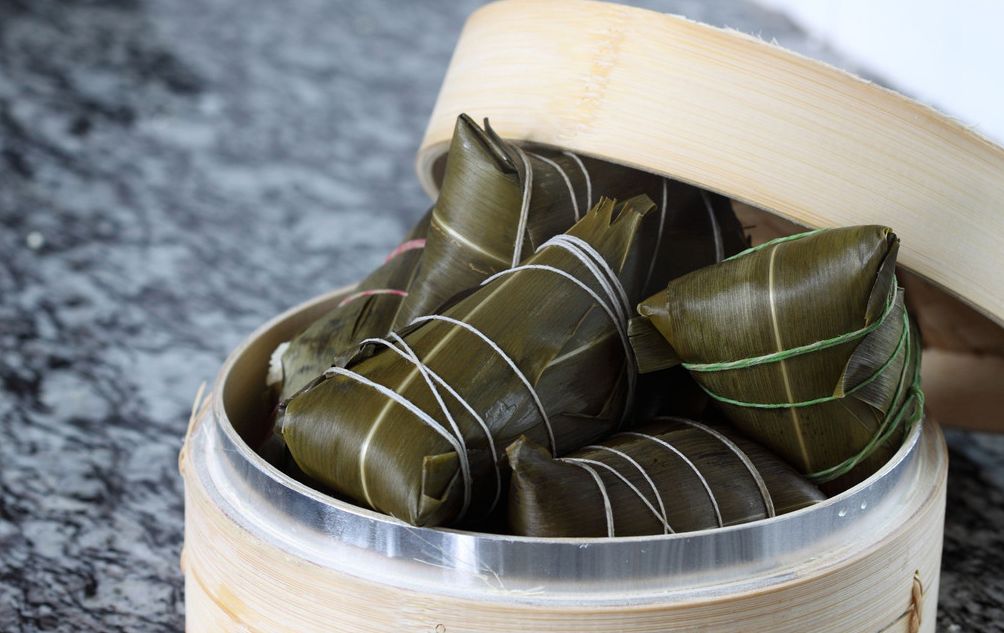Dragon Boat Festival, also called Duanwu or Tuen Ng Festival, is a traditional holiday to commemorate Qu Yuan (340-278 BC), an ancient Chinese patriotic poet. Qu Yuan’s work shows his care and devotion to his country. Composing masterpieces like Li Sao (The Lament), he is regarded as one of the greatest poets in Chinese history. After he was exiled by the king, he chose to drown himself in the river rather than seeing his country invaded and conquered by the State of Qin. He died on the fifth day of the fifth lunar month, thus people decided to commemorate him on that day every year.
With a history of over 2000 years, Dragon Boat Festival enjoys higher popularity in southern areas. Nowadays, many traditional customs and activities are held on the specified day by people in China and even by people in neighboring Asian countries.
Traditional food: Zongzi
Eating Zongzi is one of the central customs of the festival. Zongzi (sticky rice dumpling) are usually eaten during the Dragon Boat Festival. Most of them are either in the shape of a pyramid or a crushed cylinder. People often wrap the zongzi in the leaves of bamboo, lotus, reed, maize, banana, or shell ginger, depending on what kind of plants are close at hand. Also, some people tie the zongzi with string.

Steamed Zongzi
Though their fillings vary across the country, they may generally fall into two categories by taste: the sweet and the salty ones. The sweet ones may contain sticky rice soaked in water and red bean paste. If you have a sweet tooth, you can always roll them in sugar before taking a bite. Besides, the salty ones may havesalted duck egg,pork belly, taro, shredded pork or chicken, Chinese sausage, pork fat, and shiitake mushrooms inside.
If you bought some zongzi from the market, remember to steam or boil them before eating, for the people who made them simply put together the ingredients and wrap them with leaves, and they are not yet edible until cooked properly. Since the time needed depends on the type of fillings inside, you’d better consult with the seller to be absolutely sure.

Zongzi of various flavors
Dragon Boat Racing
Speaking of Dragon Boat Festival, you can never go beyond the subject – dragon boats. It is dragon boat racing exactly, which is a traditional sport event widely practiced in the Lingnan area of Southeast China.
During the festival, custom canoes are decorated in bright colors with a dragon head at the front; strong young men are selected to participate in the events, and large crowds of people gather alongside the rivers to watch several dragon boats competing fiercely for the finishing line. It is indeed a marvelous sight to observe.
Usually, such races are accompanied with bustling lion dances and followed by a big Dragon Boat Feast for sometimes more than one thousand people who, more often than not, are from the same village.
This is because, since the old times, the agriculture in the area was based on the river webs and ponds scattering the area. Different kinds of crops and fish are raised. This provides dragon boat racing the soil to flourish.
In addition, the dragon boat tradition is closely related to the local culture of hardworking, team spirit, and a friendly attitude toward Mother Earth.

A canal of the river webs
Shunde, in particular, located in a rich region of “mulberry trees and ponds”, is a county of dragon boat. Its dragon boat clubs are internationally famous for the incredible performance in championships held in countries including Germany and Hungary. Clubs like Shunde Lecong Dragon Boat Club have won more than a hundred champions in national and international contests. Also, more and more contests and clubs are emerging to attract more audience and fans as well.
With the economic development, Shunde is no longer a tranquil and peaceful village but a modern town of advanced manufacturing industry and commercial center, yet the celebration and racing remain, as the old dragon boat spirit has laid the spiritual foundation of rapid development.
What’s more, the festival certainly acts as a mental tie of the past and present as well as the people of the same ancestors and to some extent, it’s also a reminder for us to value and cherish the land that we are born in.
International Influence
Dragon boat racing has also gained great popularity around the world and widely spread its international influence. Jinji Lake Dragon Boat Racing of Suzhou, for example, has attracted numerous people from different countries over the past few years. It is reported that around 240 people from Italy, France, Canada, the U.K. and other countries will participate in this event this year. Besides, the annually held International Dragon Boat Racing in Shanghai has also become a traditional event that welcomes foreign friends to take part. One of the contestants from Russia said in an interview that nothing can be more attractive than a sport integrated with a country’s traditional culture.
Dragon boat racing is also held in countries like Turkey and the U.K. and is popular among the public. This not only reflects the joy this activity can bring to people, but also the cultural identity behind its popularity. People all over the world can have a better understanding of Chinese culture via listening to the history of the festival, eating zongzi and watching dragon boat racing. In these ways, culture and happiness and be shared widely.

People from different countries passionately participating in dragon boat racing
